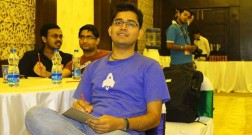Part of a series similar to the Awesome L10n Communities series where individual contributors are spotlighted for their efforts.
- Marketplace
- Other projects in need
- Previously worked on Webmaker
I began at Mozilla as a university student. Other members of the Indian community (Shahid Farooqui, Biraj Karmakar, Chandan Kumar) recruited me to be involved in the project. Shahid created an event at the university and gave me the chance to give a presentation on Mozilla design. After that event, Shahid conducted an online sprint for localizing projects in Pootle. Biraj and Shahid trained me on how to localize Firefox and other projects and then got me in touch with Rajesh Ranjan. Through Rajesh, I became familiar with the FUEL project and I became more and more involved. Seeing the software in my language was a very good and motivating experience.
Becoming a reviewer and then a l10n project coordinator for a national language (Hindi) in less than two years.
Having a clear priority for a project helps localizers to know where to concentrate all of our efforts and provide the best quality translation for the project. Take the Marketplace project, for example. When it became a priority and a need in India for the Firefox OS launches, we were able to focus on it. Before then, we didn’t focus on it. Prioritize your team’s projects within your own team. When another project priority is escalated, adjust. When there’s no escalation, rely on your team’s internal project priorities. Document these priorities on your team’s wiki page.
As a reviewer, I must also be a mentor. When I reject a string, I must follow up with them feedback on why that string was rejected to help them to improve their work and grow.
- Follow the Mozilla L10n guidelines as closely as possible.
- Following the guidelines from your regional l10n mentor.
- Be in contact with your l10n mentor frequently.
- Enjoy it! 😀
Both have their separate responsibilities, but in some ways they overlap. I’m able to organize localization events for Hindi, which helps the Hindi l10n community. As a Rep, my network goes beyond l10n, so I often help with events that aren’t l10n-specific. Where there’s a need from a specific l10n team to help, I’m able to support them with the Reps program, regardless of if it’s within the Hindi team or in another. I have helped with Bengali l10n events and the Maithili Fennec launch event in Patna.
We hold virtual l10n sprints, since the Hindi l10n community is spread throughout India. The Hindi mailing list helps to coordinate all of the work no matter where we are.
We also divide the workload and l10n project ownership. Many localizers want to be involved in Hindi l10n. It’s important to spread out the workload and give others an opportunity to participate and grow. Decentralized leadership also helps to mentor more people and share good ideas and practices.
With this month’s virtual l10n sprint, I hope that we can arrive at 80% complete in Pootle for the locale. I’m also really looking forward to reactivating the localization literacy map project in FUEL.
- I’m helpful, but sometimes it comes off as arrogant because I’m unable to help when there are communication gaps.
- I’m the leader of the FSA task force leader in India.
- I just recently became a Reps mentor 🙂
- I like soft Hindi music.
- My favorite food is biryani.









No comments yet
Post a comment